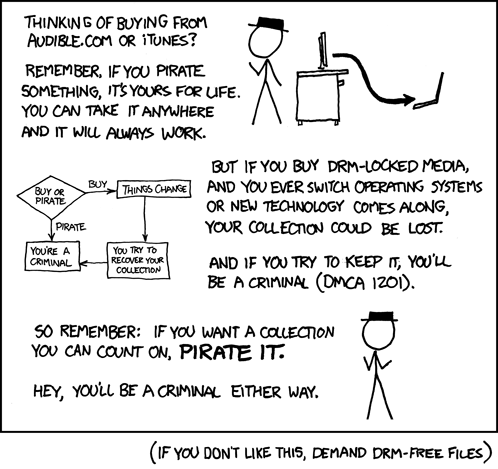So you want to be a pirate December 3, 2011

Now that we’ve talked a little bit about privacy, we’ll be covering something that many teens will be interested in: filesharing and privacy.
Let’s start with the side of the RIAA first. The RIAA is the Recording Industry Association of America. As the music industry is bleeding money from music scales due to presumably large scale piracy, they have embarked on a publicity and marketing campaign to brand music piracy as stealing. The RIAA has also sued the most prolific filesharers for exorbitant amounts, presumably to set an example and secure even more publicity. As of July 2006, the RIAA has sued over 20,000 people for file sharing.
I’ll touch a bit on anonymity even though it’s Jessica’s domain. Imagine a person sitting alone in their living room, downloading the critically acclaimed (and rightfully so, if I might add) album from Mumford & Sons, Sigh No More. How would anyone ever know if he or she is downloading the file? After all, it’s not like the RIAA or even the police have some sort of 1984-esque camera surveillance system.
Here’s how it works: if you’re using a filesharing system such as Kaaza or BitTorrent, not only are you downloading music, but you’re uploading – or “sharing” – the files at the same time. Some companies hired by the RIAA and the MPAA (for movies) monitor the trackers of specific files and take down IP addresses of those who are downloading/uploading the file via P2P. They take these IP addresses, find the ISP (internet service provider) for these addresses, and send them a subpoena to get the name and physical address of the people behind these IP addresses. With this, the cloak of anonymity is removed.
There are a couple of high profile cases that have been in the news lately, with one being he Joel Tenenbaum case. In 2009, he was ordered to pay $675,000 for willfully infringing 30 songs by downloading/uploading via KaZaA. The maximum amount that he could have been ordered to pay could have been as high as $4.5 million, but the jury awarded the RIAA a smaller award.
We’ll be discussing the topic from the opposing viewpoint next! Stay tuned!